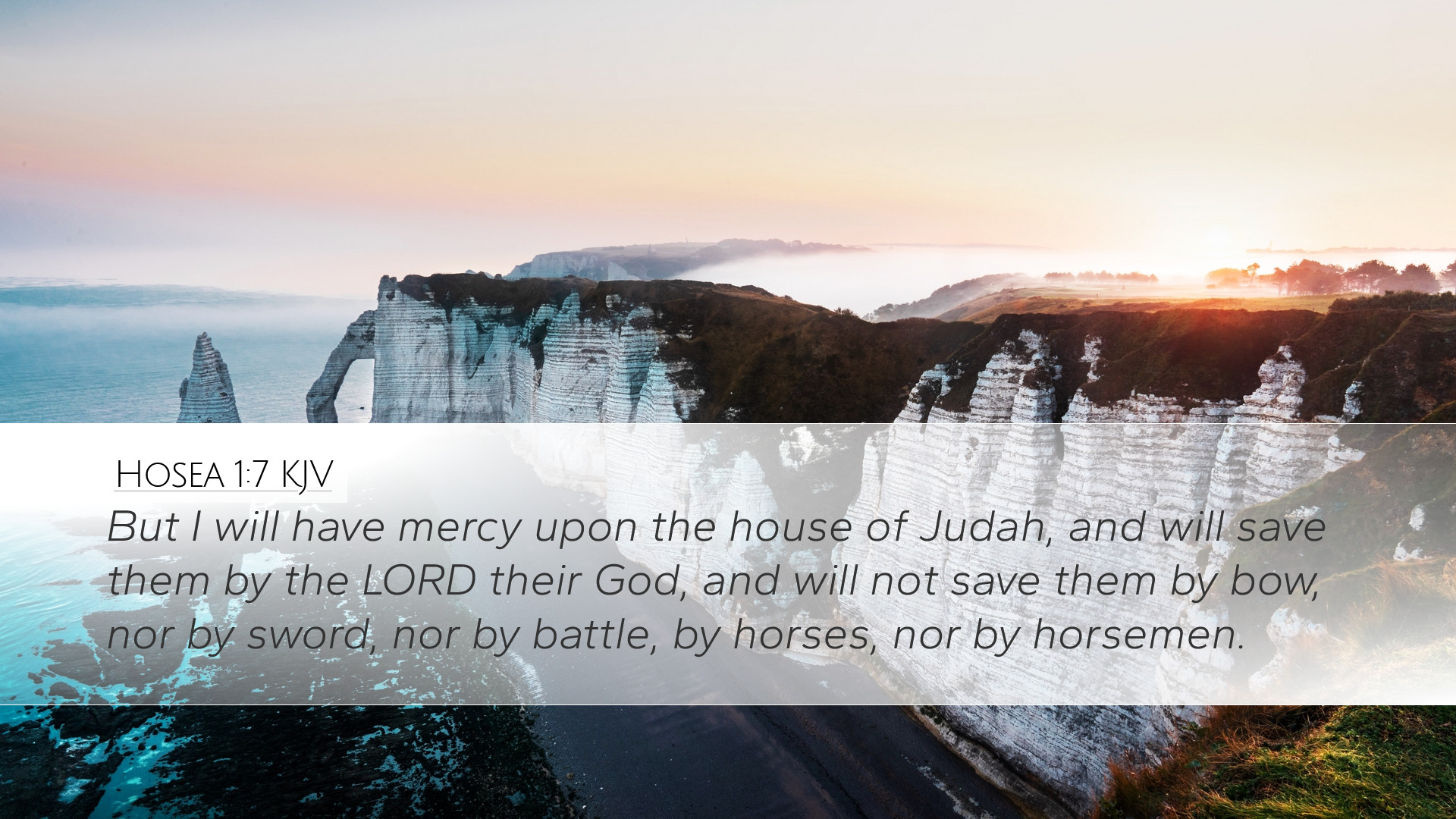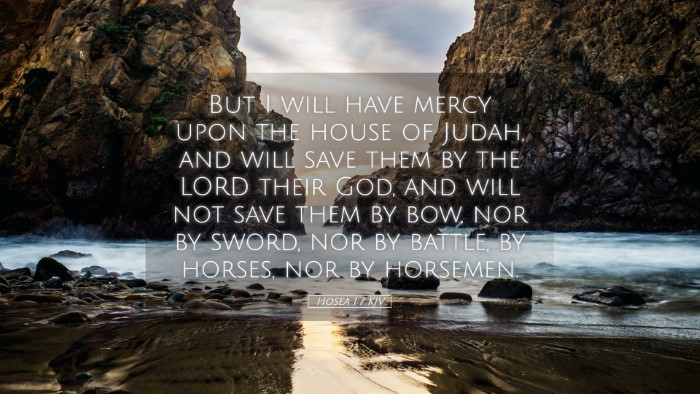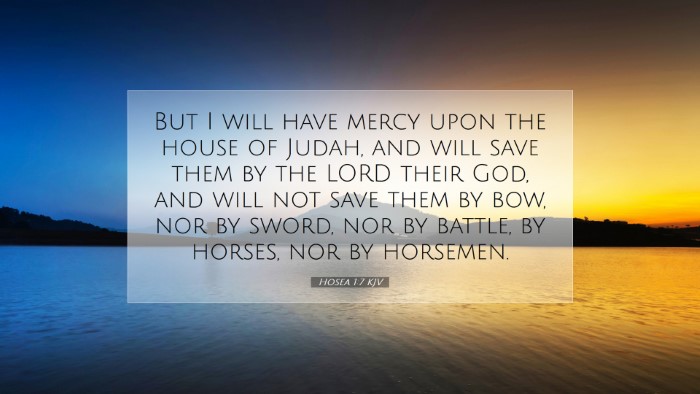Old Testament
Genesis Exodus Leviticus Numbers Deuteronomy Joshua Judges Ruth 1 Samuel 2 Samuel 1 Kings 2 Kings 1 Chronicles 2 Chronicles Ezra Nehemiah Esther Job Psalms Proverbs Ecclesiastes Song of Solomon Isaiah Jeremiah Lamentations Ezekiel Daniel Hosea Joel Amos Obadiah Jonah Micah Nahum Habakkuk Zephaniah Haggai Zechariah MalachiHosea 1:7
Hosea 1:7 KJV
But I will have mercy upon the house of Judah, and will save them by the LORD their God, and will not save them by bow, nor by sword, nor by battle, by horses, nor by horsemen.
Hosea 1:7 Bible Commentary
Commentary on Hosea 1:7
Hosea 1:7 states: "But I will have mercy upon the house of Judah, and will save them by the LORD their God: and will not save them by bow, nor by sword, nor by battle, by horses, nor by horsemen." This verse provides a profound insight into God's character and His approach to redemption and mercy, especially in the context of judgment and punishment.
Contextual Overview
The Book of Hosea is set against the backdrop of Israel's moral decay and impending judgment due to their idolatry and unfaithfulness to God. Hosea, as a prophet, uses his marriage to Gomer, an unfaithful wife, as a metaphor for God’s relationship with Israel. This context helps us understand the dual themes of judgment and grace present throughout the text.
Insights from Commentators
Matthew Henry
Henry emphasizes that this verse exhibits a stark contrast between judgment and mercy. He points out that while Israel, represented by Ephraim, will face dire consequences for their transgressions, the house of Judah can expect divine mercy. Henry explains that God's choice to save Judah is not based on their worthiness but on His sovereign grace and the promise made to David. Judah represents the faithful remnant in Israel, where God preserves a line through which the Messiah will come.
Albert Barnes
Barnes notes that the phrase "will save them by the LORD their God" implies a direct intervention from God, highlighting the futility of military power or human effort in achieving salvation. He points out that this divine deliverance signifies a transformation that is rooted not in human capability but in God's covenant faithfulness. Barnes further elaborates that this demonstrates God's loving-kindness and willingness to rescue His people, even amid their waywardness. The reference to "bow, sword, battle, horses, nor horsemen" serves as a rejection of reliance on military strength, a common idol in that era.
Adam Clarke
Clarke examines the theological implications of God’s mercy as presented in this verse. He argues that it points towards the future hope of restoration and reconciliation for Judah. Clarke makes an important observation about the nature of God's mercy; it is not earned but freely given. He also highlights that this mercy foreshadows the ultimate act of mercy through Christ, who would come from the line of Judah, further emphasizing the prophetic significance of Hosea’s message.
Theological Reflections
- Divine Sovereignty: The verse starkly illustrates the sovereignty of God in administering justice and mercy. It reminds us that God is not merely a passive observer of history; He is actively engaged in the salvation of His people.
- Contrasting Responses: The contrast between the fate of Israel and Judah serves as a profound lesson regarding faithfulness and accountability. God's mercy towards Judah is a reminder of the importance of remaining faithful to God amidst societal decline.
- Ultimate Fulfillment in Christ: This verse can be understood as a foreshadowing of the mercy found in Christ. It invites readers to contemplate how God's plan for salvation encompasses not just the preservation of Judah but all of humanity, culminating in the New Covenant.
Practical Applications
As we reflect on Hosea 1:7, there are several applications for contemporary readers:
- Reliance on God: The assurance that God saves without reliance on human forces is a timely reminder for the church today to depend on divine providence rather than worldly power or strategies.
- Hope in Righteous Judgment: This verse encourages believers to remain steadfast in faith, even when facing the consequences of collective sin. It affirms that God’s mercy is greater than human failings.
- Advocacy for Justice and Mercy: The juxtaposition of judgment and mercy calls for a balanced ministry approach that emphasizes God’s holiness while also demonstrating His love and grace.
Conclusion
Hosea 1:7 serves as a powerful reminder of God's unwavering love and mercy amidst judgment. It presents a clear distinction between the ways of the world—represented by military might—and the divine ability to save through grace alone. For pastors, students, theologians, and scholars, this verse not only illustrates a critical theological principle but also challenges the faithful to embody mercy as they reflect the character of God in a broken world.


